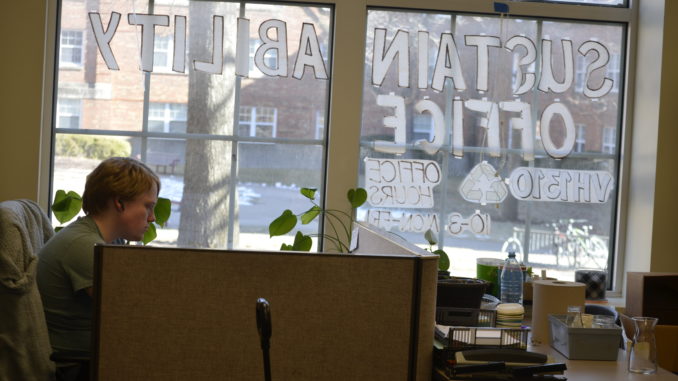
The Environmental Student Fee Accountability Committee is accepting sustainability project proposals for their 2022-23 Project Slate. The committee is seeking proposals from anyone in the Truman State University community who has an idea for improving the sustainability of Truman’s campus.
The Committee receives many proposals for sustainability every year from students and organizations of all backgrounds.
Chairman of the Committee, Drew Arends said the ESFAC projects are funded entirely by the five-dollar student fee paid every semester.
“ESFAC only relies on that fee,’ Arends said. “There is the sustainability office on campus — that organization and some other environmental clubs are provided funding by the University itself. But these projects are funded solely by the ESFAC fee,” Arends said.
Arends said past approved proposals include the solar panels at the University farm, bee houses for the native bees at the University farm, water bottle filling stations around campus and the new recycling bins in the Student Union Building.
ESFAC uses specific criteria to decide whether to approve a proposal. Arends said criteria includes environmental benefit, visibility to students, cost-effectiveness, the project’s effect on Truman’s image, feasibility, student impact, time sensitivity and student opinion.
The Committee is composed of student-at-large representatives, Student Government representatives and other representatives from environmental organizations on campus. The group will rate every proposal based on the specific criteria used by ESFAC.
“The Project Slate passed by Student Government is an accumulative list of all those proposals, and when they pass that as well, the proposals can be funded,” Arends said.
ESFAC also allocated some of the money from the student fees to long-term projects carried out over many years, such as the solar panels at the University farm. Arends said ESFAC received a total of about $34,000 from student fees this year to use toward the proposed sustainability projects.
ESFAC not only allocates money for small campus projects but also uses it toward active change in the community, Arends said. Previously, ESFAC has funded speakers for sustainability month and earth week, as well as an environmental class that was held last semester.
“It spans everything — from curriculum to outdoors to energy,” Arends said. “There is no real limit to what the sustainability component includes.”
The student input for the ESFAC process makes it unique. Arends said while other universities in Missouri have faculty or sustainability departments to decide which proposals to implement for the students, the students lead the cause at Truman State University.
ESFAC has impacted many sustainable and environmental clubs in the past, including the Save The Bees Club. Gabbi Woods, former club president, shared her experience with receiving funds from the ESFAC 2021-22 Project Slate.
The purpose of the Save The Bees Club is to promote habitats for the native bees in the area. The club sent in a proposal for new bee houses for the native bees and for a small pond to minimize the distance the bees have to travel for water, Woods said.
“We have a space at the Truman farm where we have honeybees and native plants we bought and planted,” Woods said. “Without ESFAC, we would have never gotten the solar panels and the club would have never gotten the bee houses or the pond membrane.”
Arends is finishing his two-year term as chairman of the Committee and has high hopes for the future of ESFAC and sustainability on Truman’s campus.
“These are the kind of efforts on-campus students can be involved with and feel like they’re making a difference,” Arends said.
There have already been many proposals submitted. Any student can be involved. There are student representatives that can be a part of the committee and vote, if you want to take the next step in being a part of the decision making process, Arends said.
The previous deadline for submitting project proposals of Jan. 31 has been extended to Friday, Feb. 10.
Arends expressed his desire for those on campus and in the community to take part of the advantages ESFAC gives Truman State University.
“I think the most important thing that I’d like people to know is that this fee is for them, it is funded by students, a selection of students chooses it, and really has the power to be driven by not just students, but community members of Truman,” Arends said. “It’s a great opportunity for student-chosen sustainability projects.”
